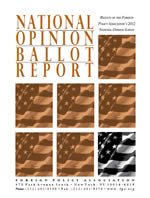Support for closer cooperation with Mexico in 2012 National Opinion Ballot
Americans participating in the Great Decisions annual National Opinion Ballot express strong support for closer cooperation with Mexico, South America on curbing drug violence.
by Catherine Ingram
Mexico has seen a dramatic improvement in the past 20 years in holding free and fair elections, yet continues to battle an ongoing “war on drugs” both within the country and along the border with the U.S. Indeed, it is estimated that up to 60,000 Mexicans have lost their lives in drug related deaths during the tenure of outgoing President Felipe Calderon. Mexico’s borders continue to present a challenge to the war on drugs, as its borders with Central America as well as with the U.S. remain a pathway for people, goods, crime and contraband in both directions.
How the U.S. should respond to transborder challenges with Mexico has long been up for debate. However, according to the Foreign Policy Association’s National Opinion Ballot Report, 80 percent of respondents felt U.S. pursuit of anti-drug initiatives required permission from the Mexican government. However, Great Decision balloters came to a general consensus that combating drug cartels and criminality should be a collaborative effort. Virtually all of the Great Decision balloters believed that neither the U.S. nor Mexico should act alone in leading anti-drug efforts in North and Central America. Rather, 92 percent of the balloters indicated that they believed either the U.S. should work with Mexico or Mexico should work with Central American nations to eradicate drug-related crime.
Ballot respondents overwhelmingly favored the restoration of a ban on semi-automatic weapons domestically; 85 percent indicated that they would support the Obama Administration restoring the ban on semi-automatic weapons that lapsed in 2004.
In recent years, the U.S. has been increasing its collaboration with Mexico. In 2007, the U.S. developed the Merida Initiative, a four-pillared program designed to combat drug-related crime on both sides of the U.S.-Mexico border. The majority of balloters indicated that the U.S. government should prioritize the first, second and fourth pillars: to provide equipment, technology and training to disrupt the capacity of organized crime; professionalize the military and police and improve the judicial system; or create jobs and pursue social initiatives to create drug-resistant communities. A plurality of balloters indicated that enhancing border security was their last priority.
As Mexico moves forward, much is left to be determined. In July 2012, Enrique Pena Nieto of the Institutional Revolution Party (PRI) was elected as president. Going forward, given the shared border and the mutual interests between Mexico and the U.S., Great Decisions balloters roundly support collaborative efforts between Mexico and the U.S. to combat drug-related crime and criminality.
READ THE 2012 NATION OPINION BALLOT REPORT







